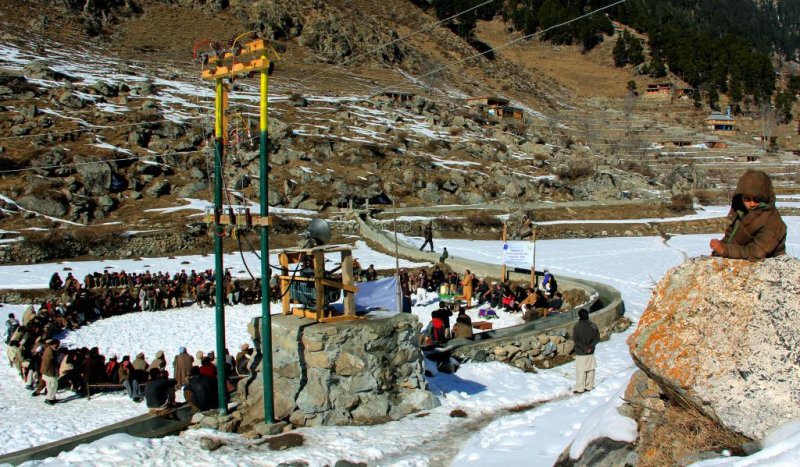1 of 3 | Residents of Serai village in Swat Valley of Khyber Pakhtoonkhwa province in Pakistan gathered Jan. 28 at their first-ever micro-hydropower station installed by the European Union. UPI Next/Fazal Khaliq
BAHRAIN, Pakistan, March 14 (UPI Next) --
Installation of a micro-hydropower station on a stream in Serai has brought electricity to the people of the remote village in the highlands of the Upper Swat Valley in northwestern Pakistan for the first time.
Residents of Serai, in Khyber Pakhtunkhwa province's Malakand Division, about 60 miles north of the Swat district capital of Mingora, say the introduction of electricity has provided them with benefits most people take for granted, such as allowing them to walk at night without fear of tumbling off steep paths to their death.
Similar power plants are in the works for the area, a move that could pave the way to solving Pakistan's increasing energy shortage.
Micro-hydropower stations require less water than do conventional hydropower stations, so a single family can install one producing 5 to 10 kilowatts for personal use.
The power station was built by the European Union and the Sarhad Rural Support Program, a development organization working in Khyber Pakhtunkhwa province and the Federally Administered Tribal Areas.
"A total of 240 micro-hydropower plants are to be installed with a production capacity of 21.7 megawatts in the parts of Malakand Division that have no access to electricity from the country's national grid," Zahid Khan, a Sarhad program project manager overseeing the installation of the plants, told UPI Next.
Most micro-hydropower plants in Pakistan can produce 5 to 100 kilowatts. The next size up, mini-hydropower plants, produce between 100 kilowatts and 1 megawatt. Small hydropower plants produce between 1 megawatt and 10 megawatts, while large plants can produce much more.
Energy experts in Malakand Division are urging government and non-government organizations to use micro-hydropower projects to tackle the country's increasing energy crisis.
Serai's 80-kilowatt power plant is among the first to be successfully installed, providing electricity to more than 700 households.
"It is something of a miracle. This is the first development project installed here. We are the most neglected and ignored people in Swat," Serai elder Abdul Qadoos told UPI Next.
"People say electricity is the source of every social development."
Another elder, Zareen Gujar, also praised the introduction of electricity.
"Our women, who used to perform household chores by torchlight, will now be able to work longer under brighter light from electric bulbs," he told UPI Next.
"Our women are now learning to use electric irons to iron our clothes too.
"We in Serai have never seen any development activity since this country came into being, as we had no roads, no middle school or high school, not even a dispensary. We have been living a life of deprivation."
Serai is in rough terrain and climbing up to houses can be difficult.
"At last, we are not blind during the darkest nights. Many of our people have died after falling at night," Gul Zada, a local community leader, told UPI Next.
"We have streetlights installed now to walk freely in at night."
Zada said no official or non-government organization had shown villagers the power potential from the water around the village.
The power plant was completed in nine months at a cost of $105,000, of which about $9,000 was raised locally.
Pakistan's federal Water and Power Development Authority says about 75 percent of Pakistanis have access to electricity from the national grid. Independent experts estimate the figure to be much lower.
"Thirty-five to 40 percent of the population ... have no electricity, and those who do have access are subject to 12 to 16 hours of power blackouts," Anwar Khan, a micro-hydroelectric power expert in Malakand division, told UPI Next.
The National Power Policy 2013 Report by the federal Ministry of Water and Power shows Pakistan has a power generation shortfall of 4,500 to 5,500 megawatts, meaning it is short by about 24 percent of the country's total needs. The enormous gap in power generation capacity and demand has led to power outages of 12 to 16 hours across the country.
As the energy crisis threatens to cripple industry and agriculture, experts advocate micro-hydroelectric projects as a potential source of electricity where there is water.
"If the government seriously makes use of the massive water potential here in Malakand division, the energy crisis can, to a great extent, be resolved," Sohail Amir, a micro-hydroelectric technology expert working in Malakand division, told UPI Next.
Pakistan's "total installed capacity of hydropower projects" as of 2010 was 6,720 megawatts, of which 3,849 megawatts was produced in Khyber Pakhtunkhwa province, 1,699 megawatts in Punjab province, 1,039 megawatts in Pakistan-ruled Kashmir and 133 megawatts in the Gilgit-Baltistan region of the Northern Areas, the government's Private Power and Infrastructure Board, which promotes private sector participation in Pakistan's power sector, said in its 2011 report "Hydro Power Resources of Pakistan."
"Abundant hydropower potential is still untapped," the report states.
The report adds that in Khyber Pakhtunkhwa about 140 hydropower project sites, with a total projected capacity of 24,736 megawatts, have been identified.
The Pakistan Tehreek e Insaaf-led provincial government has vowed several times to work on hydropower projects with the Sarhad Rural Support Program.
Khyber Pakhtunkhwa Chief Minister Parvez Khattak signed an agreement in August with the Sarhad program to generate electricity in the province.
"The Khyber Pakhtunkhwa government will extend every support to SRSP for micro-hydropower projects which will tackle the energy crisis soon," he said at a public gathering at Kalam valley in Upper Swat for the ground-breaking ceremony of two micro-hydropower projects last year.





